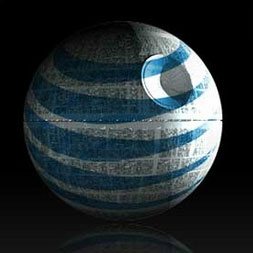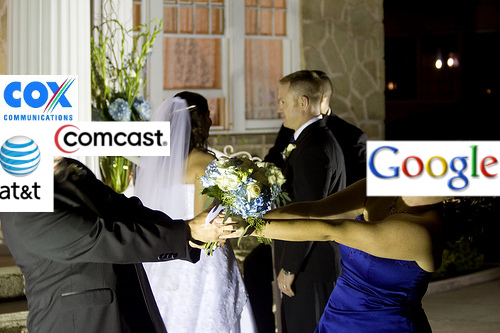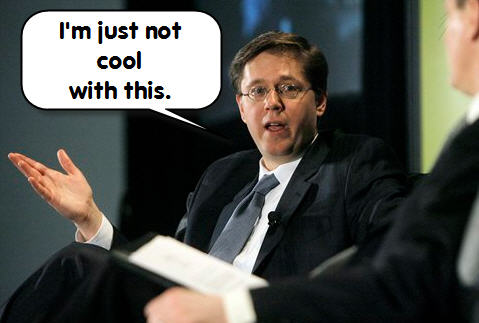Remember when you called up your ISP and, after an unholy modem screech, were billed for every minute you spent online? (Actually, it occurs to me that many Consumerist readers probably don’t remember this.) If ISPs’ current efforts pay off, we may all soon be paying for every little byte of Internet that we use.
net neutrality

AT&T Asks Employees To Oppose Net Neutrality
A reader sent us a letter that AT&T sent to its employees asking them to tell the FCC they oppose net neutrality. This comes after the FCC announced plans to investigate and enact net neutrality rules that will ensure that internet service providers (like AT&T) treat all content equally. The letter and a rebuttal are inside.

AT&T Whines To FCC That Google Voice Violates Net Neutrality
On Friday, AT&T filed a letter with the FCC accusing Google Voice of violating network neutrality principles. Google Voice doesn’t work with certain numbers that AT&T, as an old-fashioned landline and mobile provider, does.

FCC Proposes New, Awesome, Net Neutrality Rules
The FCC today proposed new rules to protect and preserve “net neutrality,” the idea that ISPs must treat all users the same and not prejudice against different types of customers. In a speech, Chairman Julius Genachowski supported adopting the “Four Freedoms” first articulated by the FCC in 2004 (PDF) not just as principles but as formal rules, and adding two more: “non-discrimination” and “transparency.” The big networks are, naturally, incensed.

FCC To Propose Net Neutrality Rules Tomorrow
The government is finally cracking down on Net neutrality? Yes, it’s time! Tomorrow, the FCC plans to propose new rules for Internet service providers to prevent them from blocking certain types of traffic.

AT&T Lifts 4Chan Block, Was To Stop DDos Attacks
AT&T released a statement about their temporary blocking this weekend of troll haven 4chan for its customers. The company said the temporary block was to stop DDos attacks on one customer emanating from IP addresses associated with the site. After the threat was over, the block was lifted. Here’s the official release:

AT&T Reportedly Blocks Wildly Popular And Deeply Offensive Website
UPDATE: AT&T has a statement. They said the temporary block was to stop DDos attacks from IP addresses associated with img.4chan.org. After the threat was over, they lifted the block.

Use Google's M-Lab To Test Your Internet Connection
Google has assembled a suite of free tools (developed by researchers, not by Google itself) that let you measure things like BitTorrent throttling, upload/download speeds, and last mile snafus. In exchange for “free,” the test data is being made public to enable further study of broadband connections. You might want to bookmark the site for future reference when you’re trying to figure out what’s going on with your ISP.

Google Takes Stance Against ISP Bandwith Throttling
Google has decided to throw its weight around when it comes to Net Neutrality; the search giant announced a plan to let end users see what their Internet Service Providers do with their bandwidth. What does this matter to you, the aforementioned end user? Inquire inside.

FCC Commissioner: Regulating Poor Comcast Compels Us To Regulate All Speech On The Internet. Huh?
FCC Commissioner Robert McDowell (R-Obviously) recently warned conservative bloggers that the Commission’s decision to repudiate Comcast for crippling Bit Torrent could lead the government to start “dictating content policy” by requiring blogs to give equal time to opposing views. Ha! Of course, this can be avoided if we vote for the *ahem* “right” candidate in November.

FCC Chairman Says Comcast "Violated Our Principles" By Arbitrarily Blocking Internet Traffic
FCC Chairman Kevin Martin told the Associated Press yesterday that Comcast had “violated our principles” when it came to managing their network. He accused Comcast of arbitrarily blocking internet traffic and failing to disclose to consumers that it was doing so.

UPDATE: Charter Will Track Your Internet Activity Regardless Of Whether You Opt Out
Last week, we wrote about Charter’s decision to begin tracking its users internet activity and inserting targeted ads. One of our readers wrote in to let us know he discovered that Charter’s insecure opt-out solution—downloading a cookie that must be downloaded for each user and browser, and downloading it again whenever the cache is cleared—only blocks the ads from showing up; it doesn’t block Charter from monitoring users’ searches and web activity.

Charter To Begin Tracking Users' Searches And Inserting Targeted Ads
Charter Communications is sending letters to its customers informing them of an “enhanced online experience” that involves Charter monitoring its users’ searches and the websites they visit, and inserting targeted third-party ads based on their web activity. Charter, which serves nearly six million customers, is requiring users who want to keep their activity private to submit their personal information to Charter via an unencrypted form and download a privacy cookie that must be downloaded again each time a user clears his web cache or uses a different browser.

Comcast Tells FCC It Doesn't Have Authority To Interfere With "Traffic Shaping"
Comcast is now claiming that the FCC “has no legal power to stop the cable giant from engaging in what it calls ‘network management practices’ (critics call it peer-to-peer traffic blocking),” reports Ars Technica. In an amazing display of spin, Comcast writes that letting the marketplace “maximize consumer welfare” has been “enormously successful” as proven by the “Comcast customer experience”—seriously, we’re not making up these phrases. On a less humorous note, the filing in which Comcast makes these claims also seems to imply that it will sue the FCC if it tries to enforce any changes on how Comcast blocks P2P traffic.
Video Of Comcast's Opening Remarks During Net Neutrality Hearing With Seats Stuffed By Company Employees
Here’s a video of Comcast VP David Cohen’s opening remarks during the FCC hearing on Monday, the one where Comcast bused in employees. These employees all wore yellow highlighters to identify themselves to company organizers.

Comcast Stacks FCC Hearing Seats With Sleepy Shills
Comcast admitted to paying its employees to sit in at a F.C.C. hearing on net neutrality at the Harvard Law School today, depriving angry protesters from their right to sit in those folding chairs. Despite the venue being filled to over capacity, keeping some people from entering, not everyone inside seemed appreciative of their privilege. One Comcast employee admitted on tape, “I’m just getting paid to hold someone’s seat, I don’t even know what’s going on.” According to SaveTheInternet.com, the Comcast employees, “arrived en masse some 90 minutes before the hearing began and occupied almost every available seat, upon which many promptly fell asleep.” The stacked audience’s behavior was limited to wearing a yellow highlighter, sleeping during the proceedings, and loudly applauding when Comcast VP David Cohen got on the mic.
Comcast: No Thanks FCC, Blogosphere Polices Us Just Fine
In the brief Comcast filed arguing that they doesn’t need the FCC telling it how not to throttle its customers’ internets, Comcast came up with a pretty special explanation:
The self-policing marketplace and blogosphere, combined with vigilant scrutiny from policymakers, provides an ample check on the reasonableness of such [network management] judgments.
So after dissing on the relevance of blogs, Comcast turns around and says that it takes blogs seriously enough that they’re a sufficient proxy for FCC regulation. The lawyer that came up with that one deserve a very big M&M cookie.

After Twitter Snafu, T-Mobile Reminds Customers Who's Boss
Last weekend, T-Mobile users who sent SMS updates to their Twitter feeds found that their messages were being blocked. Naturally, tempers flared. Many customers contacted T-Mobile to complain about the problem, but T-Mobile had no answer for the sudden blockage. (It turns out it was a technical glitch on Twitter’s end.) What’s interesting is that T-Mobile’s Executive Customer Relations rep responded to one user’s complaints with a hardcore reminder that when it comes to customer rights, his pretty much begin and end with being required to pay his bill on time. Nice PR work there, T-Mobile.
My name is Marianne Maestas and I am with the Executive Customer Relations department of T-Mobile. I am contacting you on behalf of Mr. Robert Dotson in regards to the email that you sent him yesterday evening.


